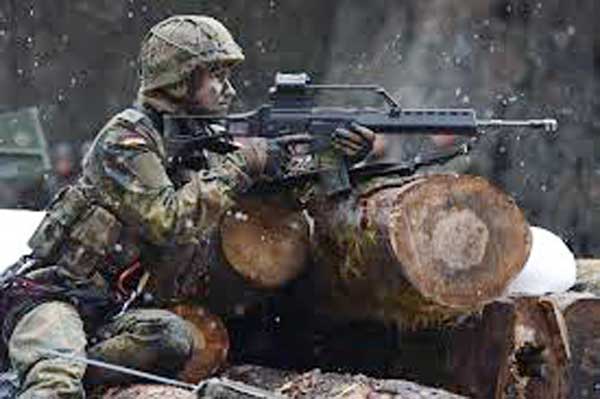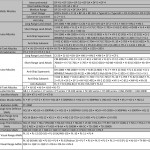Much of Germany’s rise in Europe has to do with its economic growth rather than its military strength. The reunification process of 1990’s laid significant economic pressure on West Germany to integrate the east. Fortunately for Germany, the formation of the EU, adoption of the Euro as the common currency and the establishment of the free trade zone with EU member states, provided a chance for speedy economic recovery. Similarly, with NATO, Germany got a security guarantee from the United States and major transatlantic partners, which enabled it to focus more closely on economic development. However, over the years, the transatlantic partners specially the United States have become skeptical of Germany’s economic and security policy accusing it of free riding behavior. Moreover, the concern is also shared by manyCentral and Eastern European countries that hold Germany responsible for not doing enough to meet the shared security requirement.
It is true that today Germany is the economic power house of Europe. However, its economic potential has not translated into improved military strength. Among the major European economic powers, for instance, the UK, France and Italy, Germany’s defensecontribution to NATO budget is the lowest at 1.2 percent of the GDP. Many Central and Eastern European countries including Poland, Romania and the Baltic States contribute more percentage of their GDP to the NATO defense budget than Germany. The problem with the Germanmilitaryis that of budgetary increment and military upgradationboth of which require a strong willingness by the government to increase defense spending.
The current draft federal budget adopted by the government for 2018-2022 lays out provisions to enhance defense spending on a yearly basis. The draft lays out a defense budget of 41.54 billion euros in 2019, which will be 3 billion euros more than the 2018 defense budget. In the consecutive years, the military budget will be increased gradually to 42.68 billion euros in 2022. The share of the expenditure on investment in arms and military equipment in the 2019 budget will also be increased to 18.3%; however, in the following years, it will fall to 10% in 2022. The German defense budget will amount to 1.3% of the country’s GDP in 2019. But with stable economic growth in sight, military spending would still account for less than 1.5 percent of the GDP four years from now.
In other words, what this means is that, even if the government plans to increase its defense budget systemically over the years, it will still fall short of the political commitments that itagreed to at the NATO summit in Wales in 2014, i.e. meeting 2 percent of the GDP. The lack of budgetary requirement not onlyaffects Germany’s commitment towards its NATO allies but also raises concerns over the poor condition of military hardware. A Report on the Operational Readiness of the Bundeswehr’s Primary Weapons Systems 2017 unearthed the poor condition of German military readiness. The report findings revealed that only 39 out of 128 Eurofighter jets were ready for action, while 26 out of the 93-strong fleet of Tornado fighter-bombers were operational. Transport helicopters CH-53 and NH-90 were also short in supply with 16 out of 72 operational for the former and 13 out of 58 operational for the latter. Navy frigates and tanks too suffered from operational setbacks with only 5 out of 13 frigates ready for use and 105 out of 224 leopard 2 tanks ready for combat operations.
Given the complete mismatch between the budgetary requirement, military hardwaremodernization andupgradation and Berlin’s political commitments towards its transatlantic allies, the German defense ministry has asked for an additional 12 billion euros for 2019–2022 to meet the necessary requirements. Moreover, theDefense Minister Ursula von der Leyen has criticized the draft budget bill terming it as insufficient to meet practical realities. For Ursula von der Leyen the concern is that following next year, Germany will take over the leadership of the multinational Very high Readiness Joint Task Force. VJTF comprising of 5000 strong forces was setup by NATO in 2014 to bolster the defenses of the Baltic States following the Russian aggression in Eastern Ukraine and the annexation of Crimea. The underlining feature of Very high Readiness Joint Task Force is that it is equipped with the capability of reaching combat readiness in 24 hours. Given the current situation of military hardware and budgetdeficiency, it would require a lot of political jostling for Von der Leyen to get the required resources to be ready for the task.
Infact, defense expenditure continues to remain a controversial issue in German politics. The controversy surrounds the pacifist nature in which German foreign and security policy was framed post-Soviet disintegration. With the primary focus on economic growth, security and defense became a shared issue revolving around the collective defense commitments of NATO. However, over the past decade, Germany has made certain advancements in raising its defense spending, professionalizing its armed forces and pushing the Bundeswehr further outside its geographical and operational comfort zone. German soldiers are currently involved in many foreign missions from parts of Eastern Europe all the way to Afghanistan, Iraq, Syria and Mali.
The criticism, however, over German involvement in foreign missions is that it is often undertaken from the viewpoint of showing political solidarity to European partners,not from the point of view of projecting hard power in terms of massive force or weapon deployment. The foreign policy of German republic limits Bundeswehr to only taking part in collective security operations under the mandate of the United Nations as seen mostly with the humanitarian efforts in Mali or in some cases providing military training and equipment as with the assistance given to the Kurdish peshmerga forces in Northern Iraq. In the case of Syria and Iraq, the German involvement was based on French invocation of the EU Treaty’s mutual defense clause, Article 42.7, calling for support and solidarity by joining the international coalition in the fight against the Islamic State in both Iraq and Syria. The point of consideration is that in all the military operations the German government has acted with reluctancy to embrace any kind of hard power projection.
Under current circumstances, given the changing nature of European geopolitics, the debate around increasing defense expenditure becomes even more problematic. Following the global economic slowdown of 2008-09,the rift between transatlantic partners has only widened on major economic and security issues. Particularly on matters of security; for instance, the case of Russian aggression in Ukraine. While the United States, Poland and the Baltic states called for strongermilitary action against Russian aggression, Germany opted for a diplomatic solution resulting in the Minsk II agreement. More so, given the Ostpolitik approach of dealing with Russia, Berlin and Moscow have found similar economic interest in working together. The case in point here is the Nord Stream II gas pipeline. Even the public attitude in Germany is largely in favor of co-operating with Russia. The result of the poll conducted by the Center for Insightsin Survey Research, August 2017, showsa strong majority of 61% agreeing on engaging with Russia under the pretext of Ostpolitik- enhancing economic cooperation with Moscow in support of improving German jobs and exports.
Following this, if Germany were to increase its military budget to the point of 2 percent of its GDP that would mean doubling the budget from 37 billion euros to well over 60 billion euros. Such a significant increase would not only make the German military budget biggest in Europe but would also make it bigger than that of Russia, which currently stands around $46 billion. Such actions would go against the pacifist foreign policy of German republic and would also bring into question the Ostpolitik approach for dealing with Russia- something which the business and political elite and even the public in Germany would not prefer.
In the case of conflicts in Iraq and Syria, German foreign policy does not consider armed forces to be an instrument of conflict prevention and resolution. Infact, longer the military action continues, more difficult it would become for Germany to send back refugees to their home land. For Merkel, delays in addressing the refugee problem at home would provide more political substance forfar-right parties like the Alternative for Germany (AFD), which principally campaigned on anti-immigration and anti-Islam. In this regard, as mentioned before, greater involvement of the Bundeswehr outside Germany is linked more closely to meeting the expectations of NATO allies particularly the US and France than to the perceived direct challenges to German security.
Finally given strong opposition to US President Donald Trump over his protectionist trade policies, withdrawal from the Iran nuclear deal and the continuous criticism of German defense budget seems to have a negative effect on the proponents of the increased defense budget. What could, however, work in favor of increasing defense expenditure is pressure from NATO’s eastern and southern allies regarding Germany’s responsibility to a shared commitment to strengthening Europe’s eastern flank and southern neighborhood. But with the rise of anti-EU, nationalist parties, critical of Berlin’s leadership in Europe, that prerogative for Berlin might as well be lost.





